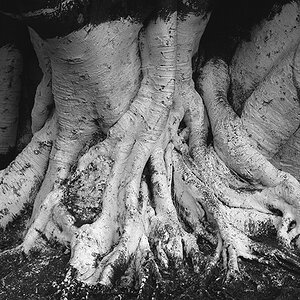Markw
No longer a newbie, moving up!
- Joined
- Jul 25, 2008
- Messages
- 4,057
- Reaction score
- 230
- Location
- Baltimore
- Website
- www.outsidetherainbow.com
- Can others edit my Photos
- Photos NOT OK to edit
There are rumors circulating about, you've all heard them, that the D800 will come in two models; one with the AA filter removed.
Now, I don't really fully understand the implications of this. I do know, however, that there are companies out there that will remove the filter for you (click). To my understanding, the filter intentionally takes some of the detail out of the photo in order to inhibit moiré. I hear that the high-resolution 36MP sensor of the D800 will be so much so that it will get rid of the moiré risk; thereby ridding the camera for the need of a filter in the first place.
To me, it looks like this can only be a good thing. It will render your lenses much sharper than their AA-filtered counterparts, and will bring out much more detail. But, if this were the case, why would they offer a D800 model with the filter at all? There has to be some drawback I'm missing.
As you can tell, I'm a bit unknowledgeable about this concept. So, if you could help me out in understanding the implications of having, and not having the filter, I'd greatly appreciate it, since the camera will likely be announced shortly.
Thanks!
Mark
Now, I don't really fully understand the implications of this. I do know, however, that there are companies out there that will remove the filter for you (click). To my understanding, the filter intentionally takes some of the detail out of the photo in order to inhibit moiré. I hear that the high-resolution 36MP sensor of the D800 will be so much so that it will get rid of the moiré risk; thereby ridding the camera for the need of a filter in the first place.
To me, it looks like this can only be a good thing. It will render your lenses much sharper than their AA-filtered counterparts, and will bring out much more detail. But, if this were the case, why would they offer a D800 model with the filter at all? There has to be some drawback I'm missing.
As you can tell, I'm a bit unknowledgeable about this concept. So, if you could help me out in understanding the implications of having, and not having the filter, I'd greatly appreciate it, since the camera will likely be announced shortly.
Thanks!
Mark










